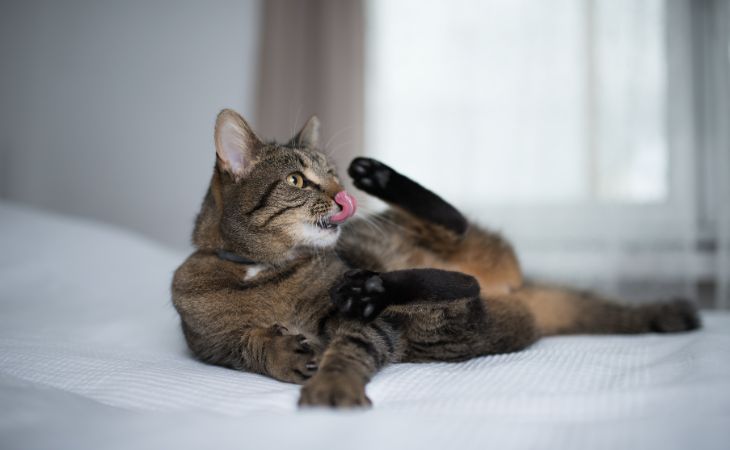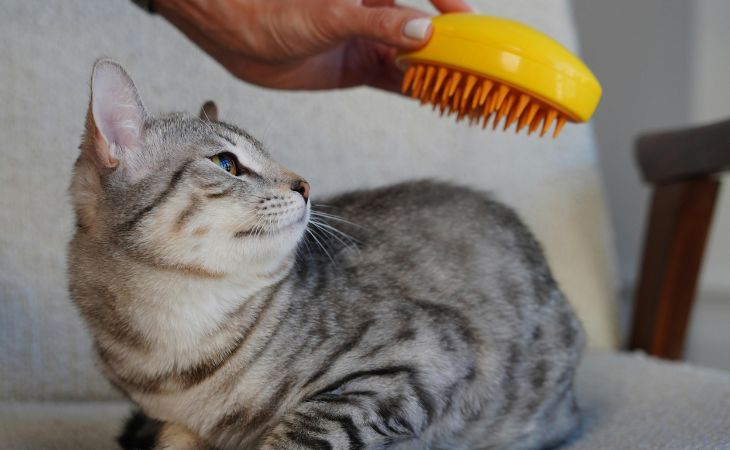Cat coats often represent the general health conditions of cats. When a coat looks greasy or dull, it probably means that your cat has an underlying issue. In this article, discover what could be the cause of your cat’s greasy fur and how you should react to resolve it.
Greasy fur: what does it mean?
Your feline’s skin is protected by “sebum”, an oily substance that secretes from the skin. When it produces excessively, it can affect parts of the body or the entire body. As a results, the coat becomes greasy and oily. It can even be covered with dandruff in certain situations, and give off an unpleasant odor. Other signs you may notice include :
- redness and itchiness,
- loss of hair,
- scabs, etc.
Cats are naturally clean and meticulous animals and they groom themselves to keep it this way. A greasy coat, accompanied with abnormal signs, is therefore an alarming sign. You need to consult a vet as soon as possible to understand the origin of the issue and opt for suitable treatment.
What could cause this issue?
A greasy coat is not normal for your feline companion. Even Persian cats, with their beautiful long coats, only have a part of their body that’s a little greasy (especially the ears and the base of the tail). A healthy cat that is properly fed and cared for will naturally have a soft, silky coat. There are many reasons why your feline companion may have a greasy coat problem. Knowing these causes will help you take better care of your pet.
Natural aging
A cat’s general condition deteriorates with age. For example, a tired, lethargic animal will be less inclined to worry about grooming. As a result, their coat will likely become greasy and less silky. Older cats that are suffering from osteoarthritis are at high risk of developing this condition.
Osteoarthritis (osteoarticular disease) destroys the animal’s bone cartilage, causing major pain and lameness. It is also be difficult for them to groom themselves properly. If your little companion finds themselves in this situation, you can provide them with an adapted diet. You can also help them groom themselves by brushing them regularly to keep their coat soft and silky.
Unhealthy diet
An undernourished cat suffers from deficiencies that will have an impact on their well-being. The lack of nutrients essential to their body’s proper functioning can make their coat greasy and dull. Therefore, make sure you feed your pet properly.
A diet that is too rich in fat, for example, will lead to excessive sebum production in the cat. This will naturally have an impact on your cat’s coat. The choice of certain dietary supplements can help provide your feline companion with the nutrients they need. Don’t hesitate to ask a vet for advice, to make sure you’re on the right track.
This Letsgetpet article might also interest you: Understanding the nutritional needs of cats
Parasite infection
Like all animals, cats are exposed to a variety of parasites, both internal and external. Ticks, mites, fleas and intestinal worms are just some examples. Unfortunately, a heavy infestation of these parasites can lead to a deterioration of the coat condition. Hair will stick together in the presence of external parasites. The cat will tend to lick or scratch the affected parts of its skin aggressively. This can lead to infections and even skin lesions.
Internal parasites feed on the nutrients that are ingested by your little feline. In addition to causing deficiencies, they contribute to the appearance of problems such as anemia, digestive disorders and many others. For this reason, it’s important to pay close attention to your cat’s behavior and health conditions, so you can react quickly.

A particular health issue
A cat’s greasy coat is never harmless. In fact, it often indicates a health problem. An overweight animal’s freedom of movement is reduced. This makes it harder to maintain their coat. Certain medical conditions can also affect a cat’s behavior, leading to greasy hair. These include:
- oral disease,
- allergies,
- dental disease, etc.
An oral condition such as stomatitis, for example, may prevent your cat from grooming properly due to the pain. Your cat may also have difficulty eating. Allergies disturb your cat’s peace of mind. Between itching, excessive licking, biting and shedding, your cat will no longer care about grooming. As a result, their coat can become greasy and dull from lack of maintenance.
My cat has greasy fur: what can I do about it?
Your cat’s coat can become greasy in a variety of situations. Poor diet, unkept hair and certain medical conditions are often at the root of this situation. To alleviate the problem, you need to clearly identify its causes in your pet, so you can opt for a suitable treatment. Here are a few solutions to counter greasy hair in your cat or prevent it from developing.
Quality food for all possible situations
Your cat needs certain nutrients for his daily well-being. With a healthy, balanced and nutritious diet (including vitamins, proteins, polyunsaturated fatty acids and minerals), you can help prevent health problems.
Their diet should be adapted to their age and general condition. Foods rich in fatty acids and vitamins A, E and B help regulate the sebum produced by the animal’s body. You can therefore choose them to help keep his coat soft and silky.
Brushing your cat regularly
Even if your cat manages to groom themselves properly, you mustn’t forget to brush him. Not only does this help prevent tangles, it also removes dead hairs. Above all, it’s a practical way of preventing greasy coat problems. So don’t spare any effort and brush your pet regularly.
It’s also a great way to spend more time with your dog. They’ll feel closer to you and less stressed. You’ll also be contributing to his overall well-being. Just make sure you choose the right products for your cat’s grooming needs. Cats are among the animals that hate baths and water in general. It may therefore be worth using a specialized dry shampoo to care for your little feline’s coat.
This Letsgetpet article might interest you: Tips for brushing a long-haired cat
Applying an effective pest control treatment
Parasites affect all cats, even the cleanest and most homely. To prevent their proliferation and look after your pet’s health, we recommend a specialized treatment. Specifically, you’ll need to worm your cat every 3 months. This procedure can be carried out by a veterinarian, or by you on the professional’s recommendation. It is usually accompanied by an anti-parasitic treatment for optimum protection of the cat.
Regular visits to the vet
By constantly monitoring your pet’s condition, you’ll be better able to react to any health problems. In this case, a visit to the vet is practical. In addition to providing your cat with quality care (preventive or curative), the professional will give you sound advice on how to prevent your cat’s hair from becoming greasy.
Above all, they’ll be able to provide personalized care for your little companion, helping you to look after his health. Visits should be regular, however, so that your pet can get used to the experience and the professional can better respond to its needs.

